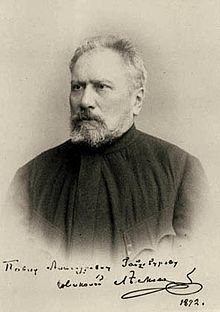The robbery (Nikolai Leskov)
The robbery ( Russian Грабёж , Grabjosch ) is a grotesque by the Russian writer Nikolai Leskow , which appeared in 1887 in the December edition of the literature supplement to the Knischki Nedeli ( weekly booklet ) .
In Oryol by the late 1830s, almost everyone thought everyone was a rascal. In the case of such bilateral general suspicion, the outrageous incident outlined below is definitely possible.
shape
The Oryol merchant Michailo Michailytsch, called Misha, told a story in 1887 that happened fifty years ago in his youth in Oryol in the middle of winter in his hometown. Leskow writes constantly about rascals, of whom the half- orphan Misha and his Mamachen, who comes from Jelez , are afraid. Because both of them lock themselves in their Oryol property even in broad daylight for fear of a robbery, they are laughed at by Ivan Leontjitsch - who is Mamachen's brother from Jelez - who is arriving unannounced. Because this 65-year-old Uncle Mishas is carrying a large sum of money and the Orjol rascals are mentioned on almost every page of the text, the reader eager for torture expects the eponymous attack by the rascals at any moment. However, Leskow has a polar punch line ready. The attack - out of fear of a rascal - was carried out by two innocent citizens: Misha and Jelez's uncle.
content
At the beginning, Mischa said about herself as a 19-year-old: "... I ... was so healthy that I had fainting spells and nosebleeds." Mamachen probably recognizes the cause. She is looking for a suitable wife for her only mother's boy. Her brother gets in the way. Church elder Ivan Leontjitsch was unable to become a deacon in Jelez . He wants to snatch one of their deacons from the orjolers. The one with the most powerful singing voice is wanted. Misha, who is familiar with the area, has to accompany his uncle to an Oryol inn, where one of two candidates is to be selected after a private church singing competition under the total exclusion of the public. The money-laden uncle took the nephew to his escort and bought him a new pocket watch that afternoon as an incentive. Momma has not yet allowed Misha to wear a watch. In the opinion of Ivan Leontjitsch, the muscular Misha could, if he wanted, kill an ox. Misha, who usually hangs in his mother's coat, has occasionally been secretly involved in scuffles in Oryol. He says about himself that he knocked ten men down with his fist while fighting.
After the evening audition within a wide range of tones, starting with the deep, distant murmur to the scream "that the window panes rattled", the uncle favors the deacon of the Oryol Nikiti Cathedral from the Dyachkov district. The full sound escapes the deacon's chest only after a glass of pure Jamaican rum. Because the innkeeper did not keep to an agreement - he secretly allowed audiences to audition - the parties split up in the dispute; leave the economy in quick succession. On the way home, the aforementioned “robbery” occurs. In the dark of the night, in the thickest snowfall on the bank of the icy Oka , the uncle, who during the day had tagged the mouthful hero at every opportunity, is afraid. Micha doesn't show anything. He and the uncle think the deacon of Nikiti Cathedral is a robber, beat him down and steal his pocket watch.
When Mischa and the uncle realize their mistake at home - Micha's new pocket watch is still ticking on the wall above Misha and he is holding a second chronometer in his hand - they face the Oryol police; show themselves. The deacon of Nikiti Cathedral, who was already in the precinct, refrains from moving to Jelez after the nightly incident.
From then on, Misha considers herself a thief and says no girl would marry him. The matchmaker Matryona Terentewna talked him out of it. He hadn't taken anything, but carried something to the police.
Misha has a wife. When the couple had children, Misha had long since got away from Mamachen's skirt.
German-language editions
Output used:
- The robbery. German by Wilhelm Plackmeyer. P. 277–327 in Eberhard Reissner (Ed.): Nikolai Leskow: Collected works in individual volumes. The juggler pamphalon. 616 pages. Rütten & Loening, Berlin 1971 (1st edition)
Web links
- The text
- Entry in the Laboratory of Fantastics (Russian)
- Entry in WorldCat
Individual evidence
- ↑ Russian Книжки Недели , monthly literature supplement to the Sankt Petersburg weekly newspaper Неделя ( The Week , 1866–1901)
- ↑ Edition used, p. 280, 15. Zvu
- ↑ Russian Дьячков
